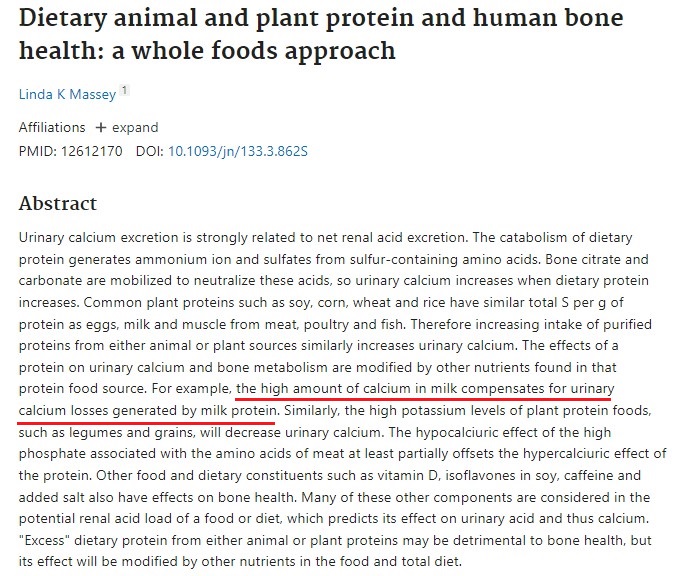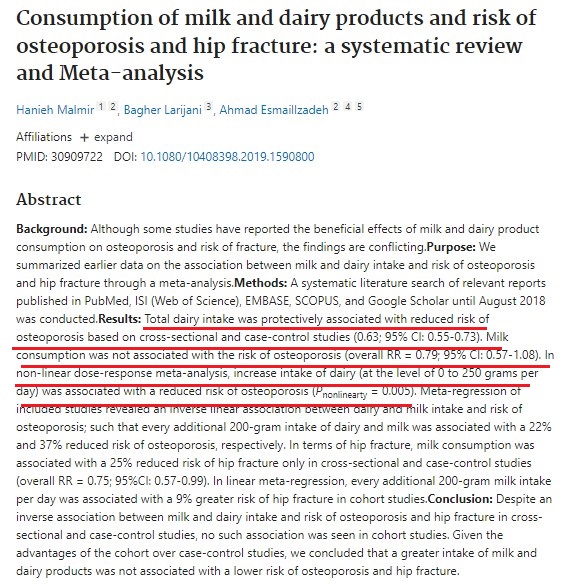A video circulating on social media asserts that milk contains significant levels of calcium and animal protein, and claims that the calcium absorbed from a single glass of milk is primarily utilized to counterbalance the waste produced by the milk’s animal proteins in the body. The post claims that the net calcium absorption after drinking a glass of milk will be zero because of the sulphur waste generated by animal protein. Also, the post states that the countries that are the highest dairy consumers have the highest incidence of Osteoporosis. Let’s verify the claim made in the post.

Claim: The animal protein in cow milk is a significant contributor for Osteoporosis disease.
Fact: Although it’s true that calcium absorbed from milk is employed to offset the urinary calcium losses caused by milk’s animal protein, the precise ratio between calcium intake and its utilization for compensating urinary calcium losses remains uncertain. While drinking milk can improve bone density and prevent osteoporosis in elderly people, some research studies suggest that consuming excessive amounts of milk could lead to increased calcium excretion in the urine that could potentially weaken bones over time. Hence, the claim made in the post is Misleading.
On searching for the details related to the claims made in the post, it is found that cow’s milk consists of approximately 87% water, with the remaining 13% comprising protein, fat, carbohydrates, vitamins, and minerals. Milk contains high amounts of calcium, animal proteins, phosphorous, and other nutrients. One Kilogram of milk contains around 35 grams of proteins and around 1200 milligrams of calcium.
As per the research studies, the high amounts of calcium in milk are used to compensate for urine calcium losses generated by milk protein. Excessive protein consumption leads to greater excretion of calcium in urine without a corresponding increase in calcium absorption. This impact of dietary protein on calcium balance is due to the acid content of animal protein. However, the precise ratio between calcium intake and its utilization for compensating urinary calcium losses remains uncertain. A research study showing the relationship between the calcium-to-protein ratio in milk and the urinary calcium excretion in healthy adults can be seen here.

While drinking milk can improve your bone density and prevent Osteoporosis in elderly people, some research studies contradict these statements and suggest that consuming excessive amounts of milk could lead to increased calcium excretion in the urine, potentially weakening bones over time. Christopher Gardner, a researcher at Stanford, emphasized that milk is indeed a valuable source of calcium but may not be the critical factor in maintaining bone health. However, it is nowhere reported that the limited intake of milk could lead to Osteoporosis or any other bone diseases.

Countries with the highest annual consumption of cow milk, such as the United States, India, and various European nations, are among the prominent countries significantly impacted by osteoporosis. However, numerous factors contribute to the prevalence of osteoporosis in these regions. The International Osteoporosis Foundation released a factsheet explicitly debunking the misconceptions linking milk and other dairy products as contributors to bone health issues.
To sum it up, this video alleging animal protein in cow’s milk is a significant contributor to the development of osteoporosis is misleading.



